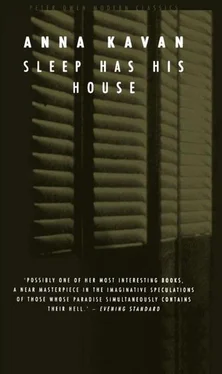Very distressed at the way her good intentions have gone wrong, B consoles herself with the prospect of getting the entire complex straightened out as soon as he comes back. But then she remembers that he will not be returning until the following week, and that by that time she herself will probably be away from home.
Once more the suburban house THE ELMS, the desirable residence. The trees have grown slightly taller. It’s raining. Saturated soft lawn, like a green sponge; black tree-trunks glistening with rain. The wet brick walls of the house: the paint on the doors and window frames is less fresh than it used to be; but this would hardly be noticeable.
A general view of the house in its trees, roofs of adjacent houses appearing on all sides through the trees. Tree-tops are doleful in grey and cold douche and drench of rain; leaves are bent under weight of raindrops, tipped, freed and weighted again; the roof, the whole slant of tiles, swims under a thin film of water, rain slithers thinly to gutters, gurgles in pipes and gutters, trickles from vent-pipes, seeps into sodden earth. Raindrops spatter a puddle beside the porch. A blind taps on a half-open window its untranslatable message.
Now inside. It’s no particular season or time of day. The rooms are chilly, somewhat dark because of the dark sky reflected in windows steadily blurring with rain. The recent thud of the front door perpetually hangs suspended in feeble blind-tapping, rain noise. Most of the rooms are unoccupied. Outmoded and unloved knick-knacks haunt the dusted drawing-room with desolate derelict neatness; the oriental boxes empty, the fretted sandalwood fan folded in exile. Encamped behind the closed kitchen doors two women servants, shut off with cups of tea, gossip and sip; they seem unconnected with the rest of the house; nor is the house affected by their presence there.
Solitary B wanders aimlessly from room to room. She is making a tour of boredom, loneliness, monotony, dullness, although she’s not conscious of it. In room after room the rain filming on all grey windows; gloss-hard or padded gentility of heavy furnishings; genteel formal masculine room, smell of telephone, leather, tobacco; aloof genteel diningroom glinting of silver.
B finally goes to her own room, stands for a minute fingers drumming the window-pane swimming in rain, then sits down on the bed, opens a book.
The book opens with a thud of the front door. Contemporaneous with this sound, the hurried suggestion of a man dressed in dark business suit and carrying a dispatch case, leaving the house, getting into his car, driving away. The empty rooms of the house filled with rain noises, dullness, nullity, the morse-tap of the blind; closed in the kitchen, the two prim-faced servants, apart in their closed world of picture papers and tea.
B turns the pages. Each one is exactly the same as the one before. She turns them faster and faster, running them over between her thumb and first finger, speeding them up into a bioscope blur, the door thuds spraying out quick like gunshot pellets. When she comes to the end she closes the book
and puts it down on the seat of the railway carriage. The train is just roaring into a tunnel. B looks back, through the transparent coaches and baggage car of the train. Far behind, very small, framed in black circular tunnel mouth, diminishing at great speed as the train rushes the opposite way, the suburban house wet in its trees, rain still greyly slanting.
At the terminus all is noise and confusion. It’s a great cold dingy place full of bewildering hustle and shouting, escaping steam-hiss, whistles and clanging bells. Everyone is in a terrific hurry: gangs of people dash wildly in different directions, loaded with all sorts of impedimenta, piles of books, bags, overcoats, boots and shoes, food, mascots, pictures, pets, awkwardly shaped wooden objects, bats and rackets, boards and unwieldy globes, which they hurriedly deposit in various places. But no sooner does one of the groups succeed in getting all these things arranged in some semblance of order than, in obedience to whistles, bells, shouts, the whole collection of articles is snatched up again to be bundled off to some other position where the process has to be gone through afresh. To add to the general confusion, loudspeakers are continually bawling out orders or directions of some kind, while, only slightly less loud, other unamplified voices seem to be reciting or chanting, and still others are carrying on shouted conversations with friends. And as if the jumbled parties helter-skeltering this way and that didn’t create sufficient disorder, isolated individuals keep scurrying among them, forcing their way in the opposite direction to their neighbours, leaping down from the tops of piles of boxes or scrambling to precarious perches on high window-ledges, perhaps in search of a missing companion or a piece of lost property, the subject of their incomprehensible shrill inquiries.
In the midst of all this turmoil B is quite at a loss. Someone who seems to be in authority has called out to her to join a certain group, which group she doesn’t hear, and before she can ask for more information the person who gave the order has disappeared. B looks round hopelessly. How in the world is she ever going to find her right place in this bear-garden? Nobody seems in the least interested in her. Nobody seems to care what she does, where she goes, what becomes of her. It doesn’t seem to matter to anyone whether she moves or stays where she is all day long. People are constantly bumping into her and pushing against her with their clumsy paraphernalia, but not one of them can spare a moment to stop and answer her questions. Occasionally an individual, better-natured than the rest, will call back before vanishing some muddled instructions, of which B cannot make head or tail — particularly since only a word or two is audible in the tumult.
She really begins to feel desperate. The people here are all so rowdy, so scatterbrained, so intent on their own higgledy-piggledy affairs, that it’s useless to try to catch their attention. And then the place is so huge and dreary, and every part of it is so much like every other part, that to find one’s way about in it seems an impossibility; to move in any direction is almost certainly to get lost among the hurrying crowds, the stacks of indiscriminate objects which are for ever collapsing as something is dragged out from the bottom, and then being chaotically heaped up anew.
Still, she can’t stand in one place indefinitely, to be jostled and pushed from one side to another. Without any aim in view, simply because there’s less of an uproar this way, B moves in a certain direction. For some reason or other there are far fewer people here, the main throng suddenly seems to be concentrated elsewhere.
Soon she’s in a quiet space, by herself, in front of a door which is evidently not meant to be opened, or even to be seen, because it is painted exactly as if it were part of the wall. However, it does open quite easily when B turns the handle, and she goes through it on to a narrow platform above a stage
where a ballet of the Graduation Ball type is in progress. The platform is flimsy and small, balanced on scaffolding up there in the wings as if perched on enormous stilts. B advances timidly to the edge of it and looks down.
Level brilliant light on the stage, warm coloured; from the footlights and in a strong generalized flood (not spotlights) from high up above. The auditorium is merely suggested by a receding tide of shadow beyond the footlights. No orchestra visible. The ballet music is stimulating: it has much gaiety, freshness, without sugariness; it has “a curious perfume and a most melodious twang”.
The dancing master in black satin knee-breeches and buckled shoes leads his class, which consists of about twenty boys and girls in equal numbers. The boys are dressed in fancified cadets’ uniforms; strapped long white trousers, gloves, coloured monkey jackets with silver or gold buttons and touches of lace. The girls’ costumes are more varied. Some wear full muslins, just over knee-length, a cross between ballet skirts and the usual young girl’s white party frock; these have wide sashes made of stiff silk with fringed ends in sharp naive colours tied in large bows behind. One or two are in period dresses, bustles or crinolines with display of lace pantalettes. Others wear fantastic versions of conventional school clothes, lustrous velvet jibbahs, candy-striped guimpes. Accessories, such as gold corkscrew-curled wigs: ropy gretchen plaits held by flat ribbons; demure chenille snoods; fans; openwork elbow-length lace mittens, black, white or coloured; bronze or black dancing sandals, crossed ankle elastics; block-toed ballet shoes in different satins.
Читать дальше












